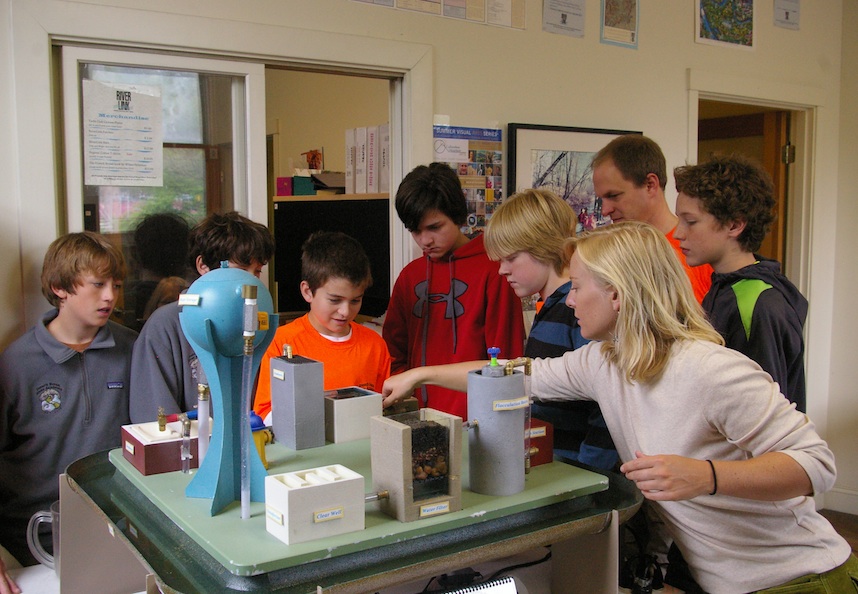Go with the flow: French Broad River Academy students visit the RiverLink office to learn about the urban water cycle, the focus of the upcoming tour. Photo courtesy of RiverLink
After millions of gallons of raw sewage spilled into the French Broad River last week, RiverLink saw an educational opportunity surface.
“If people are going to be concerned with how wastewater is managed, then it would be helpful to understand the process that actually goes along with it,” says RiverLink Education Coordinator Nikki Bauman.
To help the community understand the urban water cycle and the processes behind it, the nonprofit coordinated a tour of Asheville’s wastewater treatment plant with the Metropolitan Sewerage District of Buncombe County. The tour, scheduled for Tuesday, June 4, at 10 a.m., will be open to adolescent groups with children older than 11, interested adults and the general public. Bauman says the group will be limited to 20 people and will probably take about 1 ½ hours.
The urban water cycle, Bauman explains, goes like this: The uptake of water from the drinking water reservoir is treated and distributed to the county. It is then filtered, purified and distributed throughout the community. After that, it is piped through a sewer to the MSD plant and treated before it is released into the river.
The tour will help people understand what happens to water, Bauman says, “when you’re running the sink or taking a shower or flushing a toilet, and where that water goes from there and how is it treated before it’s put back in its natural source.”
Peter Weed, director of MSD’s wastewater treatment plant, echoes Bauman’s point. “Very few people understand the very natural process that treatment is all about after they flush. At MSD, we have a unique treatment, and it’s the largest of its kind in the world. It’s a very natural process,” he notes.
For example, when Bauman took a tour of the wastewater facility in December 2012 she was surprpised to learn how MSD uses micro-organisms and bacteria to filter wastewater.
With limited space for this particular tour with RiverLink, Weed and Bauman note that there are other ways to find out about MSD and the urban water cycle.
“They can go online and tour our facility that way. It will give people a very good idea of how it [wastewater treatment] works, and where we are and what takes places. That may be the first step to see whether or not the actual on-site would be worthwhile to them,” Weed says. For those who would rather tour MSD without leaving their computer, an online tour can be found online at MSD’s website, or by clicking here.
People can also schedule educational group tours of MSD by calling Dennis Lance at 225-8266. To schedule a tour of the wastewater treatment plant, contact Peter Weed at peterw@msdbc.org.
For people more interested in the urban water cycle itself, Bauman says RiverLink has an interactive model (pictured above) of the urban water cycle at its office at 170 Lyman St. that can be viewed from 8 a.m.-5 p.m.
To RSVP for the June 4 tour, contact the RiverLink at the contact information provided below:
Erik Fraser
RiverLinkEducation Intern
efraser@unca.edu
Cell: (910) 274-1967
Nikki Bauman
RiverLink Education Coordinator
Education@riverlink.org
828-252-8474, ext. 18




Before you comment
The comments section is here to provide a platform for civil dialogue on the issues we face together as a local community. Xpress is committed to offering this platform for all voices, but when the tone of the discussion gets nasty or strays off topic, we believe many people choose not to participate. Xpress editors are determined to moderate comments to ensure a constructive interchange is maintained. All comments judged not to be in keeping with the spirit of civil discourse will be removed and repeat violators will be banned. See here for our terms of service. Thank you for being part of this effort to promote respectful discussion.